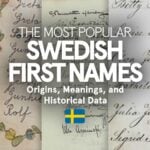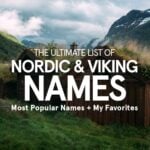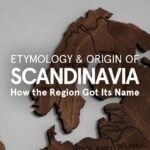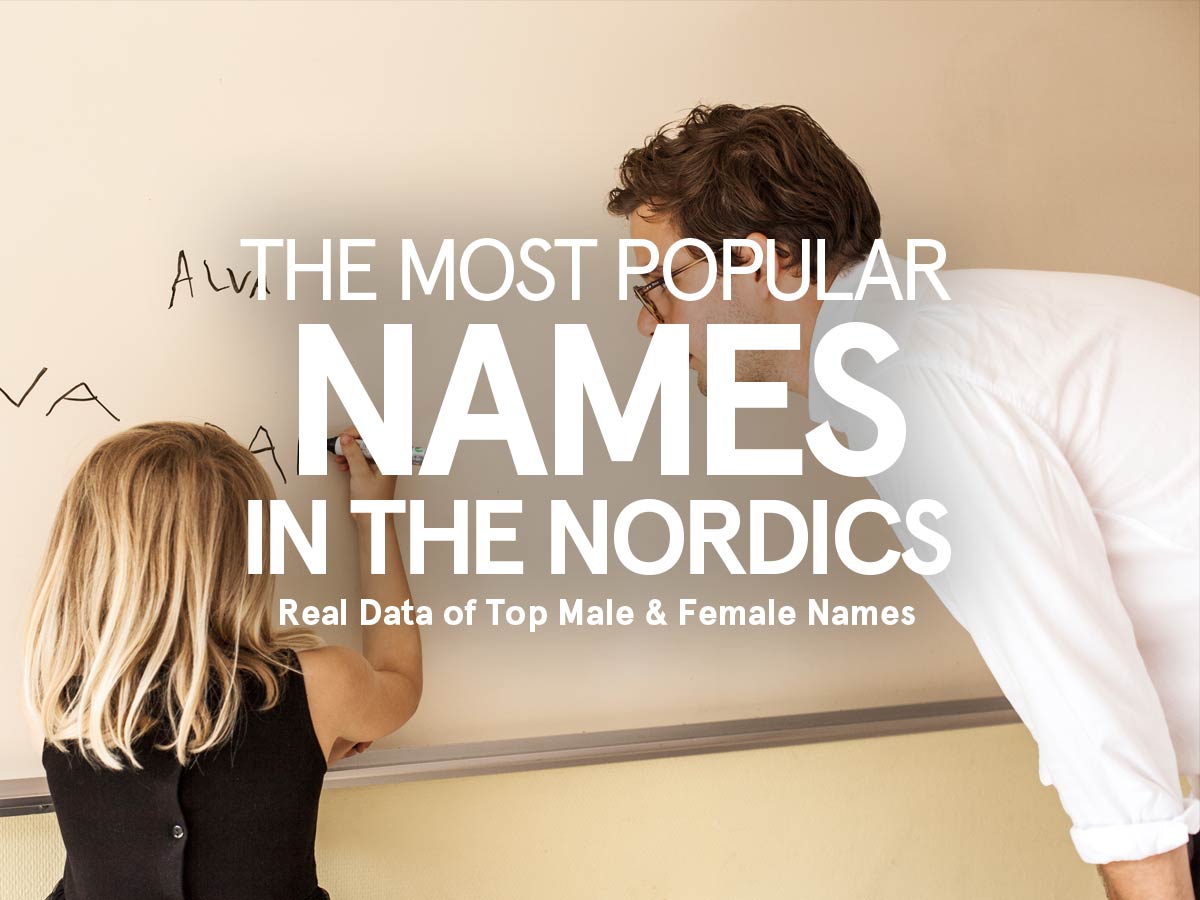It’s pretty common to see top lists of the most common names in individual countries, but since the Nordic countries mostly have similar names (or at least a lot of overlap) I was curious about what the most common first names in the Nordic region as a whole are.
So I set out to gather all the name data I could find from the different countries national statistical databases, added them all up, merged similarly spelled versions and local varieties of names, and compiled the results into neatly presented tables that make it easy to see the popularity of each name in the region as a whole.
If you’d like to find more Nordic names, check out my ultimate list of Nordic & Norse names.
- What Are the Most Common First Names In the Nordics Today?
- Top 20 Most Popular Female First Names in the Nordics
- Top 20 Most Popular Male First Names in the Nordics
- What Are the Most Common Nordic First Names For Newborn Girls?
- Top 10 Most Popular First Names For Newborn Girls in the Nordics
- What Are the Most Common Nordic First Names For Newborn Boys?
- Top 10 Most Popular First Names For Newborn Boys in the Nordics
Let’s start off with the most common ones right off the bat:
What Are the Most Common First Names In the Nordics Today?
The most popular first names in the Nordic region as a whole are Maria (195 779), Anna (186 657), and Eva (141 800) for females, and Lars (160 522), Jan (149 096), and Mikael (147 037) for males.
Interestingly, most of these names can be traced back to Hebrew origins, with traditional Germanic and Old Norse names being slightly less popular overall these days.
Let’s keep going by looking at the full lists of the most popular first names in the Nordics next, along with a short meaning for each name. Then we’ll go on to figure out which names are most popular among newborn babies specifically.
The Most Popular First Names in the Nordic Region
We’ll start looking at what the most common names are for all the Nordic countries combined, for the population as a whole and for newborn babies specifically. I’ve only counted when the names are used as first names, and not as middle names.
Using the latest available data from the official statistics databases of Sweden, Denmark, Norway, Finland, and Iceland, we can get a pretty good sense of which first names are most popular right now in the region as a whole. However, the numbers are not always exact, as some of the databases only cover the top 20, 50, or 100 names. The lists below still represents a fairly accurate estimation of the most popular names in the Nordics.
Top 20 Most Popular Female First Names in the Nordics
| First Name | Meaning | # of Nordic People |
|---|---|---|
| Maria | Maria is the Greek and Roman form of the Aramaic Mariam (and Hebrew Mirjam). It’s been used in Sweden since the 14th century and means “rebellious”, “long-awaited child”, or “loved” depending on the source. | 195779 |
| Anna | Anna stems from the biblical Hebrew Channa (mother of Maria and grandmother of Jesus), which means “mercy” or “the pardoned”. May also be related to the Celtic goddess Anu. | 186657 |
| Eva | Eva is a biblical Hebrew name meaning “life-giver” or “living one”, stemming from the Hebrew word Chawa. | 141800 |
| Ann | Ann is the English form of Anna, originating from the Hebrew Channa (meaning “mercy” or “the pardoned”). | 101777 |
| Emma | Emma is a name with Germanic roots, originally a nickname for Ermin/Emerentia (meaning “great”, “whole”, or “universal”. It has later also been used as a nickname for Emilia. | 98248 |
| Lena | Lena can be either the Scandinavian short form of the biblical Hebrew name Magdalena (which means “woman from Magdala”), or the English short form of the Greek name Helena, which means “the enchanted” and is commonly associated with Helen of Troy (a.k.a. “the most beautiful woman in the world” in Ancient Greece). | 97834 |
| Sara | Sara is a biblical Hebrew name that means “countess”, and was the name of Abrahams wife in the old testament. | 93623 |
| Karin | Karin, or Karen, is the Scandinavian short form of Katarina, stemming from the Greek word Katharos which means “pure” or “chaste”. | 93237 |
| Marie | Marie is another form of Maria and comes from the Aramaic Mariam (and Hebrew Mirjam). It means “rebellious”, “long-awaited child”, or “loved” depending on the source. | 87835 |
| Inger | Inger is a Nordic name stemming from the Old Norse name Ingegerd, which means (“farmstead”, or “protected”). | 81075 |
| Kristina | Kristina is the female form of Kristian/Christian, which stems from the Latin Christianius that means “the Christian”. | 78243 |
| Susanne | Susanne is the French form of Susanna, a Greek name that originates from the Hebrew Shoshanna, which means “lily”. | 74536 |
| Ingrid | Ingrid is a Nordic name that comes from the Old Norse Ingifridh, which means “beautiful” or “beloved”. | 74292 |
| Jenny | Jenny, or Jennie, is the English short form of Johanna, which in turn stems from the Hebrew Jochanna (meaning “God has mercy”). | 70450 |
| Hanna | Hanna comes from the Hebrew Channa and means “mercy” or “the pardoned”. | 69749 |
| Linda | Linda is a short form of any name ending in -lind, -linde, or -linda which is usually names of German origins. Linda means “soft” or “mild” in Old German, and “the beautiful” or “the petite” in Latin. | 69644 |
| Ida | Ida is a name with Old German origins, and means either “the diligent” or “the active”. Popular in Scandinavia as the sister in Astrid Lindgren’s children’s book “Emil of Lönneberga” was called Ida. | 69238 |
| Marianne | Marianne is the French form of the Latin Mariana, which means “female”. | 69221 |
| Camilla | Camilla is a name of Latin origins, and means “servant of the sacrificed” or “sacrificial priestess”. | 65517 |
| Ulla | Ulla is an Old Norse name that stems from the male name Ull, the Norse sun god. It may also derive from the German Ulrika, which means “heritage” or “powerful”. | 65361 |
Top 20 Most Popular Male First Names in the Nordics
| Name | Meaning | Nordic People |
|---|---|---|
| Lars | Lars is a short form of the Latin Laurentius which means “crowned with laurel wreath” or “man from Laurentum”. | 160522 |
| Jan | Jan is a German short form of Johannes, which is of Hebrew origins and means “the lord has mercy”. | 149096 |
| Mikael | Mikael, or Michael, is a biblical Hebrew name that means “who is like God”. | 147037 |
| Thomas | Thomas comes from the Greek Θωμᾶς (or Thōmas) which stems from the Aramaic word for “twin”. | 143862 |
| Erik | Eric is a Nordic name that originates from the Old Norse Airikr which means “lone ruler” or “always powerful”. | 132328 |
| Anders | Anders is a Nordic name that stems from the Greek word Andro which means “human”, “man”, or “miracle” depending on the source. | 131683 |
| Per | Per, also Pehr and Pär, is the Nordic short form of the Latin/Greek Petrus, meaning “rock”. | 131392 |
| Peter | Peter is the English form of the Latin/Greek Petrus, meaning “rock”. | 119423 |
| Daniel | Daniel is a Hebrew name that means “God is my judge”. | 106155 |
| Christian | Christian, or Kristian, stems from the Latin Christianius that means “the Christian”. | 103884 |
| Martin | Martin stems from the Latin Martinus, which means “Martian”. | 99722 |
| Hans | Hans is a German short form of Johannes, which is a Hebrew name that means “the lord has mercy”. | 98816 |
| Johan | Johan is a short form of Johannes, a Hebrew name meaning “the lord has mercy”. There are three Swedish kings named Johan throughout history. | 98641 |
| Fredrik | Fredrik, or Frederik, is a name of German origins meaning “peaceful ruler”. There has been a total of eleven Scandinavian kings with this name, most of them Danish. | 95804 |
| Henrik | Henrik, or Henric, stems from the German Heinrich that means “ruler of the home”. | 94966 |
| Jonas | Jonas stems from the Greek/Latin Jonah that in turns comes from the biblical Hebrew name Yonah, which means “white dove”. | 93088 |
| Mattias | Mattias, or Mathias, is a Greek form of the Hebrew name Mattitjahu that means “god’s gift”. | 92645 |
| John | John, or Jon, is the English short form of the Greek Johannes, which stems from a Hebrew name meaning “the lord has mercy”. | 89881 |
| Andreas | Andreas is a Greek name that stems from the word Andro which means “human”, “man”, or “miracle” depending on the source. | 88276 |
| Karl | Karl or Carl (usually nicknamed “Kalle”) is a Nordic name originating from the Old Germanic Karlaz, which means “free man”. A total of ten Swedish kings, including the current Carl XVI Gustaf, has the name Karl. | 86069 |
The Most Popular First Names For Nordic Newborns
What Are the Most Common Nordic First Names For Newborn Girls?
The five most popular girl names in the Nordic region are Ella, Olivia, Alma, Maja, and Emma. We can see a clear trend toward more international names for newborn girls in the Nordics, but with a couple of old Norse names still going strong (such as Freja and Astrid on 6th and 8th place).
Top 10 Most Popular First Names For Newborn Girls in the Nordics
| First Name | Meaning and origin | # of Nordic Newborns |
|---|---|---|
| Ella | Ella is a Hebrew name that means “Goddess”. Also used as a short form of Gabriella, Eleonora, Elin, Daniella, or Elisabeth. | 1280 |
| Olivia | Olivia means “Olive Tree” in latin, and has been in use in Sweden since the 18th century. | 1268 |
| Alma | Alma probably stems from the latin Almus, which means “mild”. It may also come from the Spanish word for “soul”: Alma. | 1255 |
| Maja | Maja is a Scandinavian/German/Slavic form of the greek Maia (meaning “princess”), and also a short form of Maria in Sweden since the 14th century (which either means “rebellious”, “long-awaited child”, or “loved” depending on the source. | 1241 |
| Emma | Emma is a name with Germanic roots, originally a nickname for Ermin/Emerentia (meaning “great”, “whole”, or “universal”. It has later also been used as a nickname for Emilia. | 1122 |
| Freja | Freja is the godess of fertility in Norse mythology, and means either “wife” or “ruler” in Old Norse. Freja the goddess is also connected to love, war and magic, and was traditionally written as Freyja. | 1097 |
| Nora | Nora is of either Roman or Arabic origin and means “light” or “god is my light”. It became popular in Scandinavia after Henrik Ibsen named his main character Nora in “A Dollhouse”, portraying the perfect wife and mother. Is sometimes written as Norah and Noora. | 1094 |
| Astrid | Astrid is an Old Norse name that means “god and peace” or “beautiful”. In Old West Norse it was written as Ásfríðr, and in Old East Norse as Estrid. In Norway the name is sometimes written as Astri. | 1082 |
| Selma | Selma has Celtic roots connected to the town of Shelma (which means “beautiful view”). It may also be used as a short form of the German Anselma, which means “god’s helmet”. | 920 |
| Alice | Alice stems from the Germanic Adelheid which is made up of the two words “noble” and “light”. | 903 |
What Are the Most Common Nordic First Names For Newborn Boys?
The five most popular boy names in the Nordic region are Oliver, Noah, William, Elias, and Lucas. We can see a clear trend toward more international names for newborn boys as well, with Oscar being the only name with Old Norse roots in the top 10.
Top 10 Most Popular First Names For Newborn Boys in the Nordics
| First Name | Meaning | # of Nordic Newborns |
|---|---|---|
| Oliver | Oliver is an English name with likely Greek roots. It means “calm and peaceful”, but is also connected to the word olive. | 1870 |
| Noah | Noah is originally a biblical Hebrew name that means either “rest”, “comfort”, “royal”, or “star”. | 1818 |
| William | William, or Vilhelm/Wilhelm, is a Germanic name in use in Scandinavia since the 12th century. The name is built on the two words “will” and “helmet”. | 1672 |
| Elias | Elias is a Hebrew name that means “my god”, and is usually a show of faith in one of the Abrahamic religions (Christianity, Judaism, and Islam). | 1629 |
| Lucas | Lucas is of Roman/Greek origins and means “of Lucania” (a region in southern Italy) as well as being connected to the patron saint of doctors, artists, and creatives. | 1614 |
| Oscar | Oscar comes from the Celtic “Oscur”, which in turn is believed to have come from the Old Norse Ásgeirr with the meaning “spear of the gods”. The Frankish form of the name is Ansgar. Another theory behind the name is that it stems from the two Celtic words “os” and “cara”, which would mean “friend of the deers” in Celtic. | 1499 |
| Emil | Emil is likely of Roman origins (as Æmilius) with the meaning “enthusiastic” or “driven”. | 1361 |
| Alfred | Alfred is an Old English name (spelled Ælfræd) which means “advice of the elves”. | 1293 |
| Liam | Liam is an Irish form of the name William (a Germanic name meaning “will” and “helmet”) | 1280 |
| Hugo | Hugo is a short form of the Germanic Hubert, which means “light of reason”. | 1207 |
A curious observation is that Nordic people seem to have a stronger preference toward the top 3 names when it comes to female names, but when it comes to male names the top 10 is significantly more evenly distributed.
In other words, Nordic parents seem more likely to pick a popular name for their baby girls, while they are a bit more open to picking a slightly less popular name for their boys.
Sources:
https://www.dst.dk/da/Statistik/emner/befolkning-og-valg/navne/
https://www.ssb.no/en/befolkning/navn/statistikk/navn
https://www.avoindata.fi/data/fi/dataset/none
https://www.statice.is/statistics/population/births-and-deaths/names/
 The Most Popular Swedish First Names 1920-2022 (+ Meanings)
The Most Popular Swedish First Names 1920-2022 (+ Meanings) Viking, Norse, Scandinavian & Nordic Names: The Ultimate List
Viking, Norse, Scandinavian & Nordic Names: The Ultimate List Why It Is Called Scandinavia (Origins & Meaning)
Why It Is Called Scandinavia (Origins & Meaning) Swedish Last Names: Statistics, Meanings, Origins & American Versions
Swedish Last Names: Statistics, Meanings, Origins & American Versions



Very informative